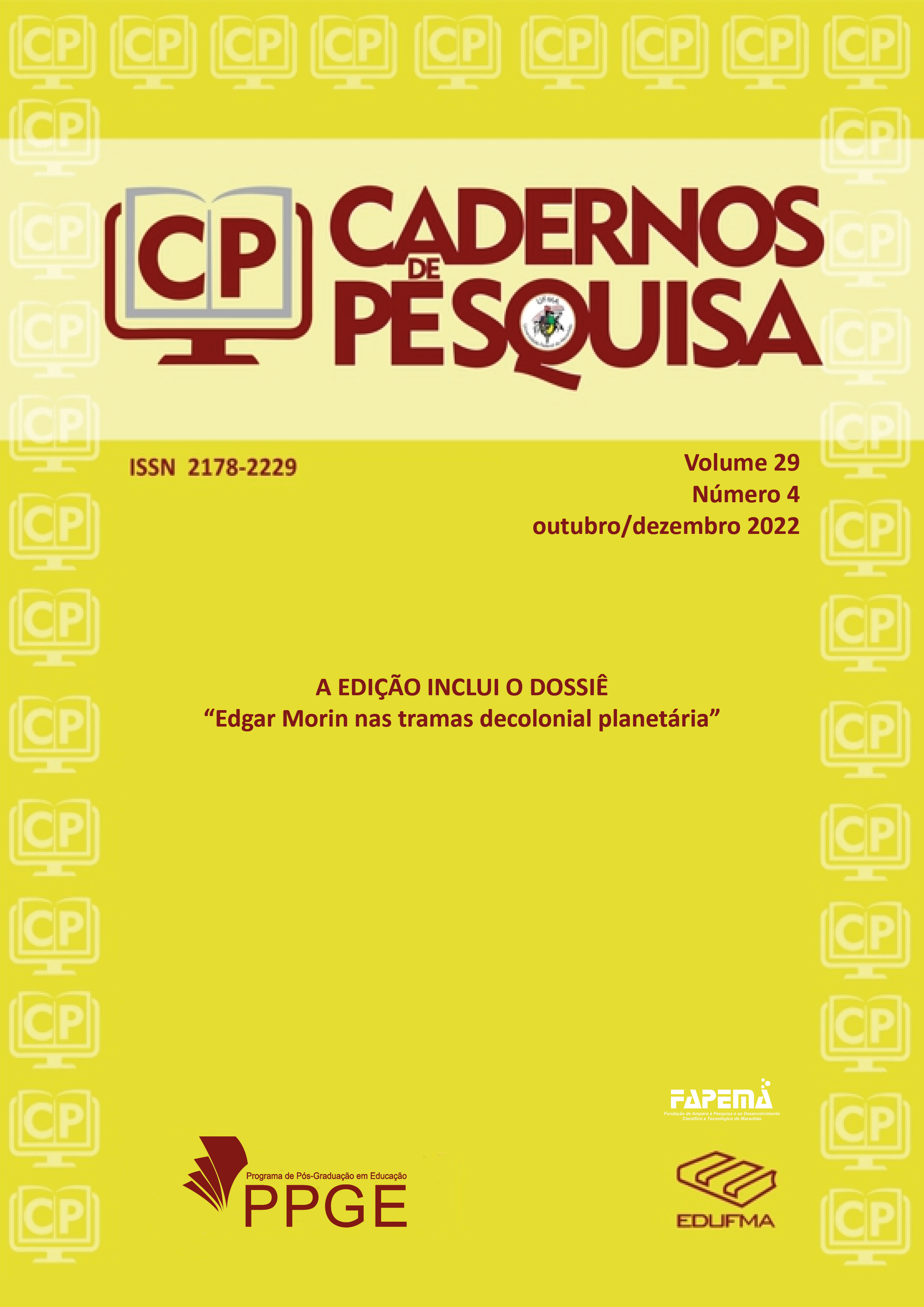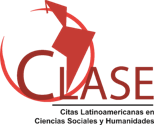PENSAMENTO COMPLEXO
tentando rever uma virada decisiva
DOI:
https://doi.org/10.18764/2178-2229v29n4.2022.62Palavras-chave:
Complexo, Ontologia, EpistemologiaResumo
Neste texto, o autor apresenta algumas divergências sobre o pensamento complexo de Morin, embora concorde amplamente com a reconstrução epistemológica de Morin. O pensamento é complexo como fenômeno cerebral, composto de dinâmicas que sequer ainda deslindamos minimamente, ou seja, em sua ontologia, mas, epistemologicamente, o pensamento, por razão evolucionária mormente, é um fenômeno de abstração seletiva que naturalmente reduz a realidade a recorrências, de preferência, invariantes. É, então, sempre uma simplificação estratégica – só explicamos o que simplificamos. Não explicaríamos o complexo usando um discurso complexo, que, por óbvio, seria ininteligível. Esta redução é doentia no positivismo, porque postula serem os formalismos discursivos realistas (a realidade é matemática, não apenas a reconstruímos usando reduções matemáticas), mas é comum em qualquer analista que busca respeitar a complexidade da realidade. Interdisciplinaridade é muito importante para uma visão mais abrangente de uma realidade que escapa, ao final, a nossos formalismos, mas só é praticável num grupo de especialistas. O analista individual é disciplinar, não só por (de)formação, mas também para poder aprofundar-se – o aprofundamento é naturalmente disciplinar. Daí a importância do trabalho em equipe que mistura disciplinas.
Downloads
Referências
ANDERS, G. You can do anything: The surprising power of a “useless” liberal arts education. New York: Little, Brown and Company, 2017.
ARIELY, D. A Taste of Irrationality: Sample chapters from Predictably Irrational and Upside of Irrationality. New York: Harper Collins, 2010.
ARIELY, D. The Honest Truth About Dishonesty: How We Lie to Everyone – Especially Ourselves. New York: Amazon, 2012.
BRASIL. Educação é a Base. MEC, Brasília, 2018. Disponível em: http://basenacionalcomum.mec.gov.br/images/BNCC_EI_EF_110518_versaofinal_site.pdf. Acesso em: 26 jul. 2022.
BELLAH, R.N. Religion in Human Evolution – From the Paleolithic to the axial age. Cambridge: The Belknap Press of Harvard University Press, 2011.
BOFF, L. Espiritualidade - um caminho de transformação. São Paulo: GMT, 2006.
BORING, E.G. Intelligence as the tests test it. New Republic, v. 36, p. 35-37. Disponível em: https://brocku.ca/MeadProject/sup/Boring_1923.html. Acesso em 26 jul. 2022.
BOURDIEU, P. Homo Academicus. Stanford: Stanford University Press, 1990.
BREINES, I., CONNELL, R., EIDE, I. (Eds.). Male roles, masculinities and violence – A culture of peace perspective. UNESCO, 2000. Disponível em: https://unesdoc.unesco.org/ark:/48223/pf0000120683. Acesso em 26 jul. 2022.
BRYNIE, F.H. 2009. Brain Sense: The science of the senses and how we process the world around us. New York: AMACOM, 2009.
BRYSON, B.P.; DAVIS, A.K. Conquering stereotypes in research on race and gender. Sociological Forum, v. 25, n. 1, p. 161-166, 2010.
COSTANDI, M. Neuroplasticity. Cambridge: The MIT Press, 2016.
DAVIES, P. The demon in the machine. London: Penguin, 2019.
DAWKINS, R. The God Delusion. New York: Houghton Mifflin Company, 2006.
DEACON, T.W. Incomplete Nature – How mind emerged from matter. New York: W.W. Norton & Company, 2012.
DELPIT, L. “Multiplication is for white people”: Raising expectations for other people’s children. London: The New Press, 2012.
DEMO, P. Pesquisa e informação qualitativa. Campinas: Papirus, Campinas, 2001.
DEMO, P. Forças e fraquezas do positivismo. 2001. https://docs.google.com/document/d/e/2PACX--1vTN0QxDDsQI85ADHBuQRVe_mEkVVfLV3dj6PB-mioHtKH7nkIIYSTILr7xP5RnYsNT7H-P_J3iIqoll/pub
DEMO, P. Felicidade como renúncia. 2013. https://docs.google.com/document/d/1qVjphapB8hVIsxsWYNmktyRbG8kdCs0lASf6puTbesQ/pub
DEMO, P. Aprender como autor. São Paulo: Gen, 2015.
DIENER, E., SANDVIK, E., PAVOT, W. Happiness is the Frequency, not the Intensity, of positive versus negative affect. In: Strack, F. et alii (Orgs.). Subjective Well-being: An interdisciplinary perspective. New York, Pergamon Press, p. 119-139, 1991.
DOIDGE, N. The Brain That Changes Itself: Stories of Personal Triumph from the Frontiers of Brain Science. London: Penguin, 2007.
DYSON, F. 2006. The Scientist as Rebel. New York: New York Review Books, 2006.
EDELMAN, G.M.; TONONI, G. 2000. A Universe of Consciousness – How matter becomes imagination. New York: Basic Books, 2000.
ENGELS, F. 1979. Dialética da Natureza. Rio de Janeiro: Paz e Terra, 1979.
ERICSSON, A. & POOL, R. 2016. Peak: Secrets from the new science of expertise. New York: Eamon Dolan/Houghton Mifflin Harcourt, 2016.
FOUCAULT, M. 2000. A ordem do discurso. São Paulo: Loyola, 2000.
GEE, J.P. Situated Language and Learning - A critique of traditional schooling. New York: Routledge, 2004.
GELB, M.J. 1998. How To Think Like Leonardo da Vinci – Seven steps to genius every day. New York: A Dell Trade Paperback, 1998.
GELERNTER, D. The tides of mind: Uncovering the spectrum of consciousness. New York: Liveright, 2016.
GOBER, M. An end to upside down thinking: Dispelling the myth that the brain produces consciousness, and the implications for everyday life. New York: Waterside Press, 2018.
GOLDSTEIN, R. Incompleteness: The proof and paradox of Kurt Gödel. New York: Norton & Company, 2006.
GORENDER, J. Marxismo sem Utopia. São Paulo: Editora Ática, 1999.
HAACK, S. 2019. Belief in Naturalism: An epistemologist’s philosophy of mind. Topics in Metaphysics. In Stelmach, J. et alii (Eds.). The Normative Mind. U. of Miami Press, p. 229-249, 2019.
HAIDT, J. 2012. The Righteous Mind: Why good people are divided by politics and religion. New York: Pantheon, 2012.
HARARI, Y.N. 2015. Sapiens: A brief history of humankind. London: Harper, 2015.
HARARI, Y.N. 2017. Homo Deus – A brief history of tomorrow. London: Harper, 2017.
HARARI, Y.N. 21 Lessons for the 21st century. New York, Spiegel and Grau, 2018.
HARRIS, A. Conscious: A brief guide to the fundamental mystery of the mind. Harper, 2019.
HARRIS, S. Waking up: A guide to spirituality without religion. New York: Amazon, 2014.
HAWKING, S.W. 2006. The Theory of Everything: The origin and fate of the universe. Beverly Hills: Phoenix Books, 2006.
HECHT, Jennifer M. Doubt – A History – The great doubters, their legacy of innovation from Socrates and Jesus to Thomas Jefferson and Emily Dickinson. New York: HarperSanFrancisco, 2003.
KAHNEMAN, D. Thinking, Fast and Slow. New York: Penguin, 2011.
KAUFFMAN. S.A. A world beyond physics: The emergence and evolution of life. Oxford : Oxford U. Press, 2019.
KAUFMAN, S. Ungifted: Intelligence redefined. New York: Basic Books, 2013.
KOCH, C. Consciousness – Confessions of a romantic reductionist. Cambridge: The MIT Press, 2012.
KOCH, C. The feeling of life itself – Why consciousness is widespread but can’t be computed. MIT Press, 2019.
KONDER, L. A Derrota da Dialética. Rio de Janeiro: Ed. Campus, 1988.
KOTLER, S. The rise of superman: Decoding the science of ultimate human performance. Amazon Publishing. 2014.
KRAUSS, L., HITCHENS, C., DAWKINS, R. A Universe from Nothing. New York: Free Press, 2012.
KUHN, T.S. A Estrutura das Revoluções Científicas. São Paulo: Ed. Perspectiva, 1975.
KURZBAN, R. Why Everyone (Else) is a hypocrite: Evolution and the modular mind. Princeton: Princeton University Press, 2010.
KURZWEIL, R.; BISSON, T. How to create a mind: The secret of human thought revealed. New York: Duckworth Overlook, 2013.
LASZLO, E. (with Alexander Laszlo, Deepak Chopra, and S. Grof). What is reality? The new map of cosmos, consciousness, and existence. New York: SelectBooks, 2016.
LATOUR, B. An Inquiry into Modes of Existence – An anthropology of the moderns. Cambridge: Harvard University Press, 2013.
LAURILLARD, D. Rethinking University Teaching. Abington: Taylor & Francis, 2007.
LAVE, J. & WENGER, E. Situated Learning: Legitimate Peripheral Participation (Learning in Doing: Social, Cognitive and Computational Perspectives). Cambridge: Cambridge University Press, 1991.
MARX, K. Contribuição para a Crítica da Economia Política. Lisboa: Estampa, 1973.
MORIN, E. Introdução ao pensamento complexo. Sulina, P. Alegre, 2005.
MORIN, E. 2006. Saberes globais e saberes locais – O olhar transdisciplinar. Garamond, 2006.
MORIN, E. Conhecimento, ignorância, mistério. Bertrand, 2020.
NAGEL, T. Mind and Cosmos: Why the materialistic neo-Darwinian conception of nature is almost certainly false. New York: Audible Studios, 2012.
NOWAK, M. (with Highfield, R.). SuperCooperators: Altruism, evolution, and why we need each other to succeed. New York: Free Press, 2011.
POERKSEN, B. 2004. The Certainty of Uncertainty – Dialogues introducing constructivism. London: Imprint Academic, 2004.
PRIGOGINE, I. & STENGERS, I. A Nova Aliança. Brasília: Ed. UnB, Brasília, 1997.
PRIGOGINE, I. O Fim das Certezas – Tempo, caos e as leis da natureza. São Paulo: Ed. UNESP, 1996.
RAMIREZ, A. Save Our Science: How to Inspire a New Generation of Scientists. New York: TED Conferences, 2013.
RASMUSSEN, D.C. The infidel and the professor: David Hume, Adam Smith, and the friendship that shaped modern thought. Princeton: Princeton U. Press, 2018.
ROTHMAN, T.; SUDARSHAM, G. Doubt and Certainty - The celebrated academy. Massachusetts: Perseus Books, Reading, 1998.
RUSHKOFF, D. Team Human. W.W. New York: Norton & Company. 2019.
SAWYER, K. Group Genius - The creative power of collaboration. New York: Basic Books, 2007.
SEMERYN, K. 2019. The conquest and resistance, a woman and a man: Feminist and imagonogical reading of W.S. Maugham’s “Rhe Unconquered”. Accents and Paradoxes of Modern Philology, v.1, n. 4, p.109-119, 2019.
SHERMER, M. Heavens on Earth: The scientific search for the afterlife, immortality and utopia. Robinson, Amazon Digital Service, 2018.
SUNSTEIN, C.R. Conformity: The power of social influences. NYU Press.
TEGMARK, M. Life 3.0: Being human in the age of artificial intelligence. New York: Knopf. 2017.
WILSON, E.O. & HASS, R. The Poetic Species: A Conversation with Edward O. Wilson and Robert Hass. New York: Belevue Literary Press, 2014.
WILSON, E.O. The Social Conquest of Earth. New York: Amazon, 2012.
Downloads
Publicado
Como Citar
Edição
Seção
Licença
Copyright (c) 2022 Cadernos de Pesquisa

Este trabalho está licenciado sob uma licença Creative Commons Attribution 4.0 International License.
A Cadernos de Pesquisa está licenciada com a Licença Creative Commons Atribuição 4.0 Internacional.



















